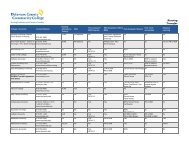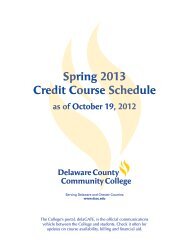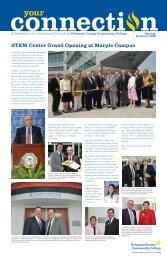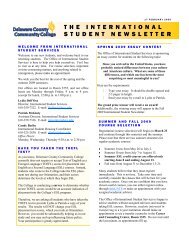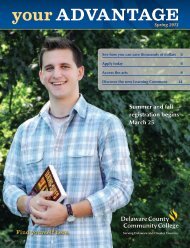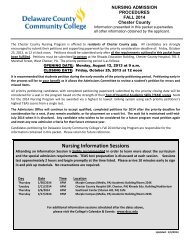2010 Catalog - Delaware County Community College
2010 Catalog - Delaware County Community College
2010 Catalog - Delaware County Community College
You also want an ePaper? Increase the reach of your titles
YUMPU automatically turns print PDFs into web optimized ePapers that Google loves.
76 COURSE DESCRIPTIONS<br />
• Compute deductions for adjusted gross income.<br />
• Identify and calculate itemized deductions.<br />
• Compute the income tax liability using tax tables and<br />
tax rate schedules. Identify and calculate various tax<br />
credits and prepayments.<br />
• Complete tax forms for the employer's reporting of<br />
FICA, State and Federal Unemployment Compensation<br />
tax, and Pennsylvania sales tax.<br />
3 Credits 3 Weekly Lecture Hours<br />
ACC 210 Federal Income Tax Accounting<br />
The objectives of this course are to explore the role of<br />
the personal income tax in the U.S. economy and to gain<br />
familiarity with income tax fundamentals. The course is<br />
intended as a business elective for students in the Business<br />
Administration curriculum and as a general elective for<br />
students enrolled in other transfer programs. Credit for<br />
this course will not be given to students who attain credit<br />
for Introduction to Tax Accounting (ACC 202).<br />
Upon successful completion of this course, students<br />
should be able to:<br />
• Discuss the revenue, social and economic objectives of<br />
the U.S. income tax.<br />
• Discuss the history of the income tax in the United States.<br />
• Describe how tax changes become law, recent tax<br />
reforms and the tax-planning process.<br />
• Gain familiarity with income tax fundamentals income<br />
concepts, exclusions, deductions, tax rates and credits.<br />
• Calculate capital gains and losses and discuss<br />
their treatment.<br />
• Calculate the deductions for medical expense, casualty<br />
losses, taxes, contributions, interest and expense of<br />
earning a living.<br />
• Identify tax policies intended to contribute to full<br />
employment and national defense.<br />
• Calculate depreciation and investment credit.<br />
• Discuss common recognition postponement techniques.<br />
Prereq. ACC 111<br />
3 Credits 3 Weekly Lecture Hours<br />
ACC 251<br />
Intermediate Accounting I<br />
This course is a comprehensive study of contemporary<br />
accounting theory, concepts, and procedures and their<br />
application to financial reporting. Intermediate problems<br />
pertaining to cash, receivables, inventories, plant and<br />
equipment, and investments in securities are presented.<br />
Understanding of the concepts covered in this course is<br />
crucial to successfully completion of all subsequent<br />
financial accounting and courses in the accounting<br />
sequence.<br />
Upon successful completion of this course, students<br />
should be able to:<br />
• Discuss the need for a conceptual framework for accounting.<br />
• Explain the importance of recognizing, measuring and<br />
reporting income and the content, purposes and<br />
limitations of a balance sheet.<br />
• Define cash and identify those items that are properly<br />
classified as cash.<br />
• Describe and apply generally accepted accounting<br />
principles for temporary and long-term investments.<br />
• Discuss issues involved in valuation and reporting of<br />
accounts and notes receivable.<br />
• Describe and explain the nature of inventories, the<br />
accounting for inventories, and effect of inventory<br />
accounting alternatives on the financial statements.<br />
• Distinguish between tangible and intangible assets,<br />
and understand the types of problems and related<br />
solutions involved in recording the acquisition, utilization<br />
and retirement of real property, equipment and<br />
intangible assets.<br />
Prereq. ACC 112<br />
3 Credits 3 Weekly Lecture Hours<br />
ACC 252<br />
Intermediate Accounting II<br />
This course is a continuation of Intermediate Accounting I.<br />
Intermediate problems pertaining to current and longterm<br />
liabilities, stockholders' equity, pensions, financial<br />
statement analysis, price-level accounting, and cash flow<br />
reporting are presented. Understanding of the concepts<br />
covered in this course is crucial to successful completion<br />
of all subsequent financial accounting and auditing courses<br />
in the accounting sequence.<br />
Upon successful completion of this course, students<br />
should be able to:<br />
• Define, classify and measure all types of liabilities.<br />
• Explain various types of long-term debt securities and<br />
the procedures involved in accounting for bonds and<br />
long-term notes.<br />
• Apply appropriate accounting procedures to the issuance<br />
of capital stock under a variety of different situations.<br />
• Identify and explain the accounting significance of<br />
transactions and events that cause the balance in the<br />
retained earnings account to change.<br />
• Calculate primary and fully diluted earnings per share<br />
under a variety of different circumstances.<br />
• Discuss the economic, accounting and practical issues<br />
involved in revenue recognition.<br />
• Explain and apply appropriate accounting procedures<br />
for intraperiod and interperiod income tax allocation.<br />
• Apply appropriate procedures to account for operating<br />
leases and capital leases by the leasee and leasor.<br />
• Identify and describe the objectives and limitations of<br />
the cash flows statement.<br />
• Discuss the objectives and the methods of financial<br />
statement analysis.<br />
Prereq. ACC 251<br />
3 Credits 3 Weekly Lecture Hours<br />
ACC 253<br />
Advanced Accounting<br />
This course is an in-depth study of selected accounting<br />
topics, including partnerships, consolidations, business<br />
combinations, bankruptcy, corporate reorganizations and<br />
multinational companies. It presents both the theoretical<br />
and applied aspects of these topics. CPA problems will<br />
be reviewed.<br />
Upon successful completion of this course, students<br />
should be able to:<br />
• Discuss the environmental factors and the underlying<br />
theoretical structure related to the accounting discipline.<br />
• Prepare consolidated financial statements under a<br />
variety of circumstances.<br />
• Properly record and report the domestic firms<br />
transactions that are denominated in foreign currency.<br />
• Explain accounting for partnerships from formation<br />
to dissolution.<br />
• Record events and exhibit results in the specialized area<br />
of governmental accounting.<br />
• Explain the accounting procedures for nonprofit<br />
organizations such as universities, hospitals, and<br />
voluntary health and welfare organizations.<br />
• Complete accounting procedures unique to estates and trusts.<br />
Prereq. ACC 252<br />
3 Credits 3 Weekly Lecture Hours<br />
ACC 254<br />
Auditing<br />
An intensive course that integrates accounting standards,<br />
accounting systems, internal accounting controls, and the<br />
dual auditing functions of investigating and reporting all<br />
within the context of the professional practices environment.<br />
Upon successful completion of this course, students<br />
should be able to:<br />
• Define and discuss the social functions of auditing, the<br />
structure of authoritative standards, professional ethics<br />
and legal liability.<br />
• Discuss the conceptual structures that underlie the audit<br />
process by establishing the linkage between the risk of<br />
material misstatement of financial statements and the<br />
evidence that the auditor gathers to reduce audit risk to<br />
an acceptable level.<br />
• Discuss the planning phase of the audit engagement.<br />
• Describe the study and evaluation of internal<br />
accounting controls.<br />
• Describe common substantive audit tests for items such<br />
as cash, inventory and accounts receivable.<br />
• Prepare various types of reports that can be issued in<br />
an audit of financial statements.<br />
• Prepare special reports such as forecasts and projections.<br />
• Discuss compilations and review services for<br />
nonpublic companies.<br />
Prereq. ACC 252<br />
3 Credits 3 Weekly Lecture Hours<br />
(ADJ) Admin. of Justice<br />
ADJ 101 Introduction to Criminal Justice<br />
A study of the agencies, processes and people involved<br />
in the criminal justice administration. Legislatures, law<br />
enforcement, prosecutor and defense counsel, courts,<br />
corrections and private security are studied with respect<br />
to function, role and the problems of justice administration<br />
in a democratic society, with emphasis on intercomponent<br />
relations, checks and balances, and discretionary powers.<br />
Upon successful completion of this course, students<br />
should be able to:<br />
• Describe how the criminal law changes to help achieve<br />
the social order in our society.<br />
• Evaluate the historical contributions to our present<br />
Anglo-American system of justice.<br />
• Evaluate the various theories that have been proposed<br />
relative to crime as a social phenomenon.<br />
• Identify, explain and evaluate the current process of<br />
each element of the criminal justice system in terms of<br />
their stated goals: crime prevention, arrest, prosecution<br />
and rehabilitation of the offender.<br />
• Evaluate the historical contributions of Great Britain to<br />
our present American system of law enforcement and<br />
describe its major impact on the role, function, authority<br />
and mission of the US Criminal Justice System.<br />
3 Credits 3 Weekly Lecture Hours<br />
ADJ 110<br />
Criminal Law<br />
Criminal Law, the foundation upon which the Criminal<br />
Justice System is built, encompasses theoretical concepts<br />
from sociology, psychology, political science, philosophy,<br />
theology and economics. It affects both the people it serves<br />
and those employed by the Criminal Justice System. The<br />
legal foundations of the U. S. Criminal Justice System are<br />
introduced to the student. Criminal offenses outlined by<br />
criminal statutes are examined with specific attention to<br />
the Pennsylvania Criminal Code.<br />
Upon successful completion of this course, students<br />
should be able to:<br />
• Explain the importance of the criminal law in<br />
maintaining social order.<br />
• Describe the basic components of the Criminal<br />
Justice System.<br />
• Analyze the concept of criminal liability.<br />
• Define the elements of specific crimes.<br />
• Recognize the requirements of various Pennsylvania<br />
criminal statutes.<br />
• Identify the liabilities of individuals convicted of<br />
criminal violations.<br />
• Identify and apply the most frequently used substantive<br />
defenses to charges of criminal acts.<br />
• Investigate the impact of the U.S. Constitution to the<br />
Criminal Justice System.<br />
Prereq. ENG 050 and REA 050 or pass test<br />
3 Credits 3 Weekly Lecture Hours<br />
DELAWARE COUNTY COMMUNITY COLLEGE




